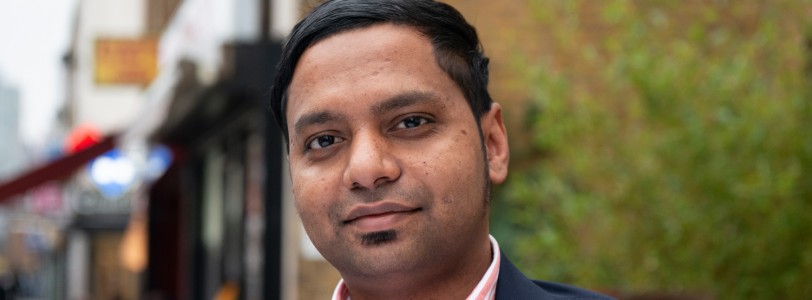Could you introduce yourself to the reader?
Hi, I am Md Mominul Hamid. I am originally from Bangladesh and now living in Newcastle Upon Tyne and I am an asylum seeker in the UK.
What is Refugee Week?
Refugee Week takes place every year across the world in the week around World Refugee Day on the 20 June. In the UK, Refugee Week is a nationwide programme of arts, cultural and educational events that celebrate the contribution of refugees to the UK, and encourages a better understanding between communities.
Refugee Week started in 1998 as a direct reaction to hostility in the media and society in general towards refugees and asylum seekers. An established part of the UK’s cultural calendar, Refugee Week is now one of the leading national initiatives working to counter this negative climate, defending the importance of sanctuary and the benefits it can bring to both refugees and host communities.
How did you first hear about Refugee Week?
I heard about Refugee week last year in 2019 while volunteering with the Tyne and Wear fire service, and joined the refugee week event organised by the city council.
And why did you want to become a Refugee Leader?
Being an asylum seeker and recognised victim of modern day slavery and trafficking into the UK, I have found it is very hard to get people to listen to our voice – both about what we are overcoming and the skills we have. The Refugee week leadership platform is a platform where I can get my voice heard and also improve my leadership skills and pass it on to the community where I live. I think this is my social responsibility to be there for my people in the community and the community I represent, which is refugee and asylum seekers.
What does that work entail?
This great initiative engaged me with a wider range of responsibility and a new kind of journey. However, I love to be in touch and make new connections throughout the country. This work empowers the refugee community to come forward and break barriers, creates inclusion amongst the community and asylum seekers and the refugees, tells positive stories and influences the community to work together to build a great nation.
Why do you think youth leadership is important?
Leaders are born by nature and they pass this on to their people. This project has taken me so far and made me strong to stand on my own rights, and most importantly has given me the opportunity to explore more into my society and the country. Leadership is important to lead the nation, and it is important to create inclusiveness from the people like me who are asylum seekers. Most importantly it is key to getting the best out of the situation, and show people that there is still an opportunity no matter what, and you can still lead the whole nation.
Can you tell us about how you ended up in the UK?
I was been trafficked and slavered by my exploiters and I was been confined for six months which is now been recognised by the home office in a conclusive ground.
Do you think the UK is doing enough to help refugees?
This is a very tough question at the moment to answer.
There are two perspectives on this. One is the private sector, and the other is the government sector. In-terms of the private sector I would say they are trying their best to be there for the refugees. However, there is some controversy about the funding process. In terms of Government I would say it is not sufficient and the never-ending hostile environment needs to be stopped, and participation of asylum seekers and refugees must be ensured at the core level of the decision making process.
What practical things can someone do to help support refugees and asylum seekers?
Currently in this pandemic, I believe we should help asylum seekers with food. As such I am running a Little Help food bank to help my community now.
[Ed. note: You can read more about Md’s incredible work to deliver food on a pushbike for people in need here.]
Working with Counterpoints Arts, how do you think art helps to bring cultures together?
Counterpoints Arts helps people accept the cultural differences of people and celebrates those cultural differences. For example, there is a tendency only to highlight certain cultures, certain foods and certain refugees. Counterpoints Arts, I think, is using arts to bring together the diversified cultures and celebrate them collectively.
What does identity mean to you?
I am a fan of French philosopher Michel Foucault, and by reading him I understood that identity evolves in relation to and in response to power. But, I also believe that people have multiple identities. For example, I am a Newcastle resident but at the same time I am a proud Bangladeshi citizen. I am a citizen advice advisor, I am a devoted Muslim, and I am a law student – but like I said before, identity is related to power. The power system (Home office) identified me as an asylum seeker and recently as a victim of slavery and trafficking.
What do you do outside of your work on Refugee Leaders work?
I currently work in eight different organisations as a volunteer. Citizens advice Newcastle, Tyne and Wear fire and rescue services, Counterpoint Arts as a Refugee week leader, University of Sanctuary, City of Sanctuary Advisory panel, Curious Monkey theatre group, D6 Culture in Transit, and Md’s Little help food bank Covid-19.
Where can people find out more about what you do?
I have my own blog about my journey which is - https://abirking.com/
I have my YouTube channel where I post my video blogs- “Md’s Journey” https://www.youtube.com/channel/UC4_ScY32f5c6gAoAg3cYnnA
And my twitter- @abirhamid2017.
You can find out more and sign up to the Refugee Week newsletter at www.refugeeweek.org.uk.









0 Comments